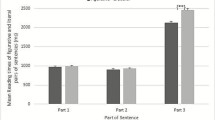Abstract
Target sentences containing familiar and less familiar idioms used either literally or figuratively or containing no idioms were presented repeatedly for 100 msec per presentation. Each sentence was preceded by a short paragraph. The number of presentations required to read each target sentence and the cued recall of those target sentences containing idioms were recorded. Control sentences required fewer presentations to be read than all sentences except those with less familiar idioms used literally. Sentences with less familiar idioms used literally required fewer presentations to be read than those with less familiar idioms used figuratively and those with familiar idioms used literally. Familiar idioms were recalled significantly more often than less familiar idioms. The results of this study were unexpected and a model of idiom comprehension incorporating these results and those of other researchers is proposed. This model suggests that idioms fall along continuums of figurative meaning familiarity and literal meaning likelihood, and that their positions along these continuums determines whether the figurative or the literal meaning is processed initially.
Similar content being viewed by others
References
Boatner, M. T. (Ed.) (1969).A dictionary of idioms for the deaf. Woodbury, NY: Barron's Educational Series.
Bobrow, S., & Bell, S. (1973). On catching on to idiomatic expressions.Memory and Cognition, 1, 343–346.
Cicchetti, D. U. (1972). Extension of multiple-range tests to interaction tables in analysis of variance: A rapid approximate solution.Psychological Bulletin, 77, 405–408.
Estill, R. B., & Kemper, S. (1982). Interpreting idioms.Journal of Psycholinguistic Research, 11, 559–568.
Gibbs, R. W. (1980). Spilling the beans on understanding and memory for idioms in conversation.Memory and Cognition, 8, 149–156.
Gibbs, R. (1986). Skating on thin ice: Literal meaning and understanding idioms in conversation.Discourse Processes, 9, 17–30.
Gibbs, R. W., & Gonzales, G. P. (1985). Syntactic frozeness in processing and remembering idioms.Cognition, 20, 243–259.
Mueller, R. A., & Gibbs, R. W. (1987). Processing idioms with multiple meanings.Journal of Psycholinguistic Research, 16, 63–81.
Ortoney, A., Shallert, D. L., Reynolds, R. E., & Antos, S. J. (1978). Interpreting metaphors and idioms: Some effects of context on comprehension.Journal of Verbal Learning and Verbal Behavior, 17, 465–477.
Popiel, S. J., & McRae, K. (1988). The figurative and literal senses of idioms, or all idioms are not used equally.Journal of Psycholingustic Research, 17, 475–487.
Reagan, R. T., (1987). The syntax of english idioms: Can the dog be put on?Journal of Psycholinguistic Research, 16, 417–441.
Schweigert, W. A. (1986). The comprehension of familiar and less familiar idioms.Journal of Psycholinguistic Research, 15, 33–45.
Schweigert, W. A., & Moates, D. R. (1988). Familiar idiom comprehension.Journal of Psycholinguistic Research, 17, 281–296.
Swinney, D. A., & Cutler, A. (1979). The access and processing of idiomatic expressions.Journal of Verbal Learning and Verbal Behavior, 18, 523–534.
Author information
Authors and Affiliations
Rights and permissions
About this article
Cite this article
Schweigert, W.A. The muddy waters of idiom comprehension. J Psycholinguist Res 20, 305–314 (1991). https://doi.org/10.1007/BF01074283
Accepted:
Issue Date:
DOI: https://doi.org/10.1007/BF01074283




